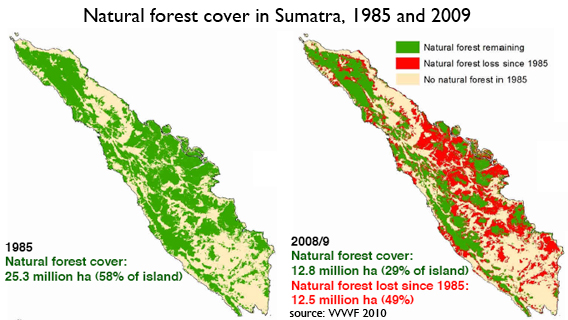
Hasbro, the second largest American toy company, today announced a new packaging policy that excludes the use of fiber produced via destruction of rainforests, reports Greenpeace.
The policy requires suppliers of forest products to “demonstrate compliance with all applicable international and national legal requirements for forest management, harvest, manufacturing and trade.” It mandates third party verification of legality in cases when a supplier is sourcing from areas determined to be “high risk” for illegal logging.
Hasbro says is will not use any virgin fiber that contains Mixed Tropical Hardwood (MTH), which typically indicates the fiber has been derived from clearing of natural rainforests.
“Forest products that originate from Controversial Sources shall not be purchased,” says the toy giant.
Hasbro’s new policy comes in response to a high-profile Greenpeace campaign that targeted toy companies for the fiber used in their packaging. Mattel and Lego have also announced sourcing safeguards to ensure the toy packaging does not contribute to deforestation.
Greenpeace’s campaign is intended to put pressure on Asia Pulp & Paper (APP), a paper supplier blamed for destruction of biologically-rich forests on the Indonesian island of Sumatra. APP has a large land bank that includes hundreds of thousands of hectares of natural forest that serves as critical habitat for endangered species like the Sumatran tiger. Concerns over APP’s management of these lands, combined with its marketing practices, have led a number of prominent companies to cut ties with the paper products giant.
Greenpeace says six other companies — in addition to Hasbro — have recently dropped APP as a supplier: The Warehouse, New Zealand’s largest group of department stores; Delhaize, the second largest retailer in Belgium and owner of Food Lion in the US; Metcash, one of Australia’s largest supermarket chains; Montblanc, a luxury pen maker; Tchibo, the world’s fifth largest coffee roaster; and Cartamundi, the world’s largest maker of playing cards.
“Asia Pulp and Paper is bad for Indonesia’s forests and bad for Indonesia’s reputation, and is even threatening the Indonesian President’s own commitment to save the forests”, said Bustar Maitar, Greenpeace South East Asia forests campaigner, in a statement. “APP must immediately commit to stop destroying rainforests”.
Greenpeace wants APP to adopt a comprehensive forest policy similar to that enacted by palm oil giant Golden Agri Resources (GAR), its sister company. GAR’s policy requires free prior informed consent in dealing with local communities and excludes conversion of lands with more than 35 tons of carbon, a provision that protects rainforests and peatlands from oil palm development. Since launching the policy GAR has won back several major palm oil customers.
Greenpeace is stepping up pressure on APP in the U.S. market by targeting its toilet paper brand Paseo. The campaign group says Paseo products have no recycled content and are made of 100 percent virgin tree fiber, some of which comes from tree plantations established by cutting down rainforests in Sumatra.
Related articles